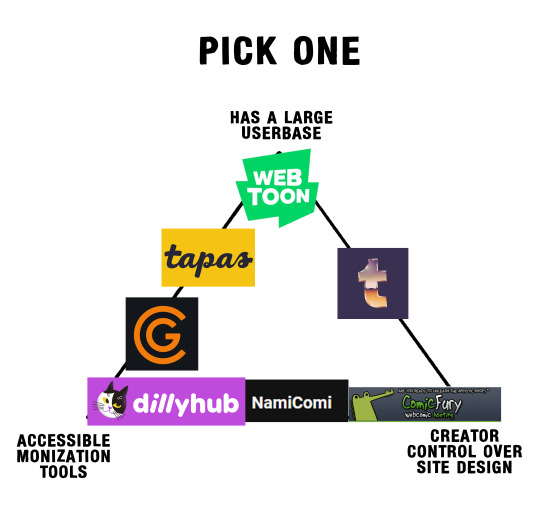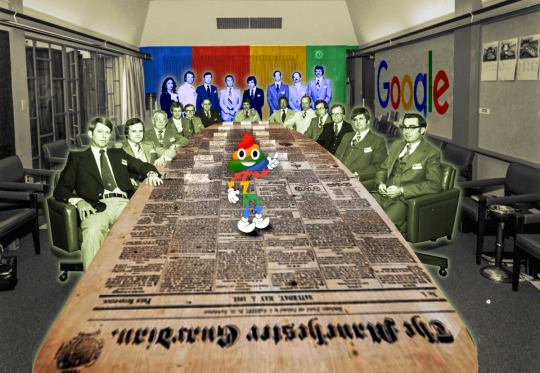#ad collections
Text

12K notes
·
View notes
Note
Tbh at this point you should just make your own webcomic app/website because it would probably be 100 times better than whatever going on with webtoon right now.
hahaha it wouldn't tho, sorry 💀
Here's the fundamental issue with webcomic platforms that a lot of people just don't realize (and why they're so difficult to run successfully):
Storage costs are incredibly expensive, it's why so many sites have limitations on file sizes / page sizes / etc. because all of those images and site info have to be stored somewhere, which costs $$$.
Maintenance costs are expensive and get more so as you grow, you need people who are capable of fixing bugs ASAP and managing the servers and site itself
Financially speaking, webcomics are in a state of high supply, low demand. Loads of artists are willing to create their passion projects, but getting people to read them and pay for them is a whole other issue. Demand is high in the general sense that once people get attached to a webtoon they'll demand more, but many people aren't actually willing to go looking for new stuff to read and depend more on what sites feed them (and what they already like). There are a lot of comics to go around and thus a lot of competition with a limited audience of people willing to actually pay for them.
Trying to build a new platform from the ground up is incredibly difficult and a majority of sites fail within their first year. Not only do you have to convince artists to take a chance on your platform, you have to convince readers to come. Readers won't come if there isn't work on the platform to read, but artists won't come if they don't think the site will be worth it due to low traffic numbers. This is why the artists with large followings who are willing to take chances on the smaller sites are crucial, but that's only if you can convince them to use the site in favor of (or alongside) whatever platform they're using already where the majority of their audience lies. For many creators it's just not worth the time, energy, or risk.
Even if you find short-term success, in the long-term there are always going to be profit margins to maintain. The more users you pull in, the more storage is used by incoming artists, the more you have to spend on storage and server maintenance costs, and that means either taking the risk at crowdfunding (ex. ComicFury) or having to resort to outsider investments (ex. Tapas). Look at SmackJeeves, it used to be a titan in the independent webcomic hosting community, until it folded over to a buyout by NHN and then was pretty much immediately shuttered due to NHN basically turning it into a manwha scanlation site and driving away its entire userbase. And if you don't get bought out and try your hand at crowdfunding, you may just wind up living on a lifeline that could cut out at any moment, like what happened to Inkblazers (fun fact, the death of Inkblazers was what kicked off the cultural shift in Tapas around 2015-16 when all of IB's users migrated over and brought their work with them which was more aimed towards the BL and romancee drama community, rather than the comedy / gag-a-day culture that Tapas had made itself known for... now you deadass can't tell Tapas apart from a lot of scanlation sites because it got bought out by Kakao and kept putting all of its eggs into the isekai/romance drama basket.)
Right now the mindset in which artists and readers are operating is that they're trying way, way too hard to find a "one size fits all" site. Readers want a place where they can find all their favorite webtoons without much effort, artists wants a place where they can post to an audience of thousands, and both sides want a community that will feel tight-knit. But the reality is that you can't really have all three of those things, not on one site. Something always winds up having to be sacrificed - if a site grows big enough, it'll have to start seeking more funding while also cutting costs which will result in features becoming paywall'd, intrusive ads, creators losing their freedom, and/or outsider support which often results in the platform losing its core identity and alienating its tight-knit community.
If I had to describe what I'm talking about in a "pick one" graphic, it would look something like this:

(*note: this is mostly based on my own observations from using all of these sites at some point or another, they're not necessarily entirely accurate to the statistical performance of each site, I can only glean so much from experience and traffic trackers LMAO that said I did ask some comic pals for input and they were very helpful in helping me adjust it with their own takes <3).
The homogenization of the Internet has really whipped people into submission for the "big sites" that offer "everything", but that's never been the Internet, it relies on being multi-faceted and offering different spaces for different purposes. And we're seeing that ideology falter through the enshittification of sites like Twitter, Facebook, Instagram, etc. where users are at odds with the platforms because the platforms are gutting features in an attempt to satisfy shareholders whom without the platforms would not exist. Like, most of us aren't paying money to use social media sites / comic platform sites, so where else are they gonna make the necessary funds to keep these sites running? Selling ad space and locking features behind paywalls.
And this is especially true for a lot of budding sites that don't have the audience to support them via crowdfunding but also don't have the leverage to ask for investments - so unless they get really REALLY lucky in EITHER of those departments, they're gonna be operating at a loss, and even once they do achieve either of those things there are gonna be issues in the site's longevity, whether it be dying from lack of growing crowdfunding support or dying from shareholder meddling.
So what can we do?
We can learn how to take our independence back. We don't have to stop using these big platforms altogether as they do have things to offer in their own way, particularly their large audience sizes and dipping into other demographics that might not be reachable from certain sites - but we gotta learn that no single site is going to satisfy every wish we have and we have to be willing to learn the skills necessary to running our own spaces again. Pick up HTML/CSS, get to know other people who know HTML/CSS if you can't grasp it (it's me, I can't grasp it LOL), be willing to take a chance on those "smaller sites" and don't write them off entirely as spaces that can be beneficial to you just because they don't have large numbers or because they don't offer rewards programs. And if you have a really polished piece of work in your hands, look into agencies and publishing houses that specialize in indie comics / graphic novels, don't settle for the first Originals contract that gets sent your way.
For the last decade corporations have been convincing us that our worth is tied to the eyes we can bring to them. Instead of serving ourselves, we've begun serving the big guys, insisting that it has to be worth something eventually and that it'll "payoff" simply by the virtue of gambler's fallacy. Ask yourself what site is right for you and your work rather than asking yourself if your work is good enough for them. Most of us are broke trying to make it work on these sites anyways, may as well be broke and fulfilled by posting in places that actually suit us and our work if we can. Don't define your success by what sites like Webtoons are enforcing - that definition only benefits them, not you.
#my favorite out of these is comicfury because it gives you the most control out of all of them#and you can offer monetization tools like ads and patreon links#it also offers super easy tools to help build your own site if you're new to that#it's as close to “running your own site” as comic hosting can get#but you can also learn how to run your own site if you want undeniably full control without fear of the platform host shuttering#also look into collectives like SpiderForest!#they basically operate as a co-op where people host their work with them and get ad opportunities#but you have to apply to get in#ama#ask me anything#anon ama#anon ask me anything#webcomic tips
6K notes
·
View notes
Text

hunters 🐅🌾☀️
i’m SO excited to learn more about this mysterious guy…
#WHO IS HEEEE#why does his design perfectly complement cyno’s…#I HAVE SO MANY QUESTIONS#all i DO know is that he’s a cutie#i’m adding him to my collection of pretty genshin men ~#inspired by that one tweet that pointed out his resemblance to a rishboland tiger 👀#my art#genshin impact#genshin#sethos#2024 art#rissaito
3K notes
·
View notes
Text

who cares what happens now
just keep your hand in mine
#now that we’ve all collectively processed the Honda Odyssey scene#I’m fucking ready for the tenderness baby#deadpool vs wolverine#poolverine#deadclaws#logan howlett#wade Wilson#artists on tumblr#fanart#marvel#Hugh jackman#Ryan Reynolds’s#yes I rewatched the version of Oklahoma with Hugh#as a treat#free with ads on YT btw
3K notes
·
View notes
Text


This man wants to be a father so bad.

Look at him in the background here. I don’t know if you can tell, but he’s bouncing. HE’S BOUNCING.
Bonus:


😭 🤗🫠
Pen, you’re needed.
#future father of pen’s children#colin bridgerton#polin#bridgerton#luke newton#adding Dad Colin to my collection of colins
2K notes
·
View notes
Text


The prefect has a day off! Choose what you would like to do:
- Visit the mountains with Jade ◀
- Visit people with Floyd
(Featuring @umichipearl's Yuu with Jade)
#my art#twisted wonderland#twst#floyd leech#jade leech#oc#twst yuu#twst mc#twst oc#shiokawa mayu#floyd leech x yuu#floydmayu#jade leech x yuu#pearl#cute hangout ideas!#nothing wrong here!#jade's just happy to share his hobby#floyd's like shrimpy you're free? come with me#just another regular day collecting debt for the lounge#yuu watching like 🧍♀️#this was actually the one thing i wanted to draw today but i got#distracted#working on other pieces#edit: added some colour
950 notes
·
View notes
Text

do NOT talk to him or his daughter ever again
#goth dad and pastel daughter my beloveds...#this is not leaks but imma just say that if mihoyo give them a familial relationship i WILL do a backflip and die#adding him to my collection of single fathers#genshin impact#wriothesley#sigewinne#fontaine#my art
4K notes
·
View notes
Text
So Cater's new groovy...

Oh, I see you TWST.

Ok, something something feeling of drowning, trapped, trying to call for help, no one listening, something something.
#twisted wonderland#twst#cater diamond#they really used that scene for Cater's groovy I SEE YOU TWST YANA WHOEVER DID THIS!#cant articulate right now brain too full but guys tell me we see this#I NEED to know what his vignette says#also adding him to the “why you smiling like that buddy?” collection (it's just all the platinum groovies minus rook because rook)
1K notes
·
View notes
Text
and they were galpals

#oh i am SO predictable#alternative captiob to this post: welll... good luck babes!#but idk if the dndadders like chappel roan☹️#also lawl this is gonna sound SO stupid but as a lesbian this is. so INSANELY important to me😭#i will write so much fanfiction#for the firsy time in my life#i will write an essay anf publish it when s3 ends#if theyre not canon i will cry myself to sleep until the day i die#dndads#dungeons and daddies#apple pie#IDK I SAW SOMEONE PITCH THAT AD THEIR SHIP NAME AND A PART OF ME MELTED#Kelsey Grammar#is it with an e or an a?? nobody knows#Trudy Trout#someone notify my asap whrn we collectively agree on a ship name#the peachyville horror#peachyville#love them so so so much#god dammit they did it again#hey siri play heaven is a place on earth and do it NOW#me and my girl when we're literally trudy and kelsey
1K notes
·
View notes
Text

#my art#postal dude#postal 1997#fan art#adding to my collection of men in glasses with longer hair length#but seriously I was so surprised when I checked where this guy's from and I remembered playing the games (1&2)#must have been in some game magazine#but I cant imagine the first game is fun playing without a joystick#also sorry about crimping his hair
426 notes
·
View notes
Text

good afternoon,
#op is a mortuary science major :P#do sixth graders learn algebra? probably not#i certainly hope they do not.#although algebra was back when math was fun so...#dcmk#dcmk textposts#<- the collection of my bs#ALT added#edogawa conan#detective conan
1K notes
·
View notes
Text

Ep. 2 „Family“ - the park scene 🌿🐾🧡
#the peace I felt watching this scene 😩🥹🧡#Charlie just casually adding another hoodie to his collection of clothes he stole from Nick#as he should#heartstopper#heartstopper fanart#osemanverse#nick and charlie
2K notes
·
View notes
Text
These are available in August!
#stamp collecting#stamps#usps#ad&d 1e#dungeons and dragons#ttrpg#d&d#old school renaissance#osr#ad&d#dnd5e#dnd#dnd1e#d&d 5th edition#d&d 5e#collectibles#d&d art#dnd art
598 notes
·
View notes
Text



hunter quickly acquiring every eye colour known to man
#adding them to his collection ig (cries)#toh spoilers#thanks to them#thanks to them spoilers#the owl house spoilers#toh#the owl house#hunter#toh hunter#mine og
12K notes
·
View notes
Text

British Royal Family - The Prince of Wales dancing to Taylor Swift’s ‘Shake It Off’ at the Eras Tour in London | June 21, 2024
#royaltyedit#royaltygif#theroyalsandi#prince of wales#prince william#prince william prince of wales#british royal family#my gif#added collection to his dance video
467 notes
·
View notes
Text
UK publishers suing Google for $17.4b over rigged ad markets

THIS WEEKEND (June 7–9), I'm in AMHERST, NEW YORK to keynote the 25th Annual Media Ecology Association Convention and accept the Neil Postman Award for Career Achievement in Public Intellectual Activity.

Look, no one wants to kick Big Tech to the curb more than I do, but, also: it's good that Google indexes the news so people can find it, and it's good that Facebook provides forums where people can talk about the news.
It's not news if you can't find it. It's not news if you can't talk about it. We don't call information you can't find or discuss "news" – we call it "secrets."
And yet, the most popular – and widely deployed – anti-Big Tech tactic promulgated by the news industry and supported by many of my fellow trustbusters is premised on making Big Tech pay to index the news and/or provide a forum to discuss news articles. These "news bargaining codes" (or, less charitably, "link taxes") have been mooted or introduced in the EU, France, Spain, Australia, and Canada. There are proposals to introduce these in the US (through the JCPA) and in California (the CJPA).
These US bills are probably dead on arrival, for reasons that can be easily understood by the Canadian experience with them. After Canada introduced Bill C-18 – its own news bargaining code – Meta did exactly what it had done in many other places where this had been tried: blocked all news from Facebook, Instagram, Threads, and other Meta properties.
This has been a disaster for the news industry and a disaster for Canadians' ability to discuss the news. Oh, it makes Meta look like assholes, too, but Meta is the poster child for "too big to care" and is palpably indifferent to the PR costs of this boycott.
Frustrated lawmakers are now trying to figure out what to do next. The most common proposal is to order Meta to carry the news. Canadians should be worried about this, because the next government will almost certainly be helmed by the far-right conspiratorialist culture warrior Pierre Poilievre, who will doubtless use this power to order Facebook to platform "news sites" to give prominence to Canada's rotten bushel of crypto-fascist (and openly fascist) "news" sites.
Americans should worry about this too. A Donald Trump 2028 presidency combined with a must-carry rule for news would see Trump's cabinet appointees deciding what is (and is not) news, and ordering large social media platforms to cram the Daily Caller (or, you know, the Daily Stormer) into our eyeballs.
But there's another, more fundamental reason that must-carry is incompatible with the American system: the First Amendment. The government simply can't issue a blanket legal order to platforms requiring them to carry certain speech. They can strongly encourage it. A court can order limited compelled speech (say, a retraction following a finding of libel). Under emergency conditions, the government might be able to compel the transmission of urgent messages. But there's just no way the First Amendment can be squared with a blanket, ongoing order issued by the government to communications platforms requiring them to reproduce, and make available, everything published by some collection of their favorite news outlets.
This might also be illegal in Canada, but it's harder to be definitive. The Canadian Charter of Rights and Freedoms was enshrined in 1982, and Canada's Supreme Court is still figuring out what it means. Section Two of the Charter enshrines a free expression right, but it's worded in less absolute terms than the First Amendment, and that's deliberate. During the debate over the wording of the Charter, Canadian scholars and policymakers specifically invoked problems with First Amendment absolutism and tried to chart a middle course between strong protections for free expression and problems with the First Amendment's brook-no-exceptions language.
So maybe Canada's Supreme Court would find a must-carry order to Meta to be a violation of the Charter, but it's hard to say for sure. The Charter is both young and ambiguous, so it's harder to be definitive about what it would say about this hypothetical. But when it comes to the US and the First Amendment, that's categorically untrue. The US Constitution is centuries older than the Canadian Charter, and the First Amendment is extremely definitive, and there are reams of precedent interpreting it. The JPCA and CJPA are totally incompatible with the US Constitution. Passing them isn't as silly as passing a law declaring that Pi equals three or that water isn't wet, but it's in the neighborhood.
But all that isn't to say that the news industry shouldn't be attacking Big Tech. Far from it. Big Tech compulsively steals from the news!
But what Big Tech steals from the news isn't content.
It's money.
Big Tech steals money from the news. Take social media: when a news outlet invests in building a subscriber base on a social media platform, they're giving that platform a stick to beat them with. The more subscribers you have on social media, the more you'll be willing to pay to reach those subscribers, and the more incentive there is for the platform to suppress the reach of your articles unless you pay to "boost" your content.
This is plainly fraudulent. When I sign up to follow a news outlet on a social media site, I'm telling the platform to show me the things the news outlet publishes. When the platform uses that subscription as the basis for a blackmail plot, holding my desire to read the news to ransom, they are breaking their implied promise to me to show me the things I asked to see:
https://www.eff.org/deeplinks/2023/06/save-news-we-need-end-end-web
This is stealing money from the news. It's the definition of an "unfair method of competition." Article 5 of the Federal Trade Commission Act gives the FTC the power to step in and ban this practice, and they should:
https://pluralistic.net/2023/01/10/the-courage-to-govern/#whos-in-charge
Big Tech also steals money from the news via the App Tax: the 30% rake that the mobile OS duopoly (Apple/Google) requires for every in-app purchase (Apple/Google also have policies that punish app vendors who take you to the web to make payments without paying the App Tax). 30% out of every subscriber dollar sent via an app is highway robbery! By contrast, the hyperconcentrated, price-gouging payment processing cartel charges 2-5% – about a tenth of the Big Tech tax. This is Big Tech stealing money from the news:
https://www.eff.org/deeplinks/2023/06/save-news-we-must-open-app-stores
Finally, Big Tech steals money by monopolizing the ad market. The Google-Meta ad duopoly takes 51% out of every ad-dollar spent. The historic share going to advertising "intermediaries" is 10-15%. In other words, Google/Meta cornered the market on ads and then tripled the bite they were taking out of publishers' advertising revenue. They even have an illegal, collusive arrangement to rig this market, codenamed "Jedi Blue":
https://en.wikipedia.org/wiki/Jedi_Blue
There's two ways to unrig the ad market, and we should do both of them.
First, we should trustbust both Google and Meta and force them to sell off parts of their advertising businesses. Currently, both Google and Meta operate a "full stack" of ad services. They have an arm that represents advertisers buying space for ads. Another arm represents publishers selling space to advertisers. A third arm operates the marketplace where these sales take place. All three arms collect fees. On top of that: Google/Meta are both publishers and advertisers, competing with their own customers!
This is as if you were in court for a divorce and you discovered that the same lawyer representing your soon-to-be ex was also representing you…while serving as the judge…and trying to match with you both on Tinder. It shouldn't surprise you if at the end of that divorce, the court ruled that the family home should go to the lawyer.
So yeah, we should break up ad-tech:
https://www.eff.org/deeplinks/2023/05/save-news-we-must-shatter-ad-tech
Also: we should ban surveillance advertising. Surveillance advertising gives ad-tech companies a permanent advantage over publishers. Ad-tech will always know more about readers' behavior than publishers do, because Big Tech engages in continuous, highly invasive surveillance of every internet user in the world. Surveillance ads perform a little better than "content-based ads" (ads sold based on the content of a web-page, not the behavior of the person looking at the page), but publishers will always know more about their content than ad-tech does. That means that even if content-based ads command a slightly lower price than surveillance ads, a much larger share of that payment will go to publishers:
https://www.eff.org/deeplinks/2023/05/save-news-we-must-ban-surveillance-advertising
Banning surveillance advertising isn't just good business, it's good politics. The potential coalition for banning surveillance ads is everyone who is harmed by commercial surveillance. That's a coalition that's orders of magnitude larger than the pool of people who merely care about fairness in the ad/news industries. It's everyone who's worried about their grandparents being brainwashed on Facebook, or their teens becoming anorexic because of Instagram. It includes people angry about deepfake porn, and people angry about Black Lives Matter protesters' identities being handed to the cops by Google (see also: Jan 6 insurrectionists).
It also includes everyone who discovers that they're paying higher prices because a vendor is using surveillance data to determine how much they'll pay – like when McDonald's raises the price of your "meal deal" on your payday, based on the assumption that you will spend more when your bank account is at its highest monthly level:
https://pluralistic.net/2024/06/05/your-price-named/#privacy-first-again
Attacking Big Tech for stealing money is much smarter than pretending that the problem is Big Tech stealing content. We want Big Tech to make the news easy to find and discuss. We just want them to stop pocketing 30 cents out of every subscriber dollar and 51 cents out of ever ad dollar, and ransoming subscribers' social media subscriptions to extort publishers.
And there's amazing news on this front: a consortium of UK web-publishers called Ad Tech Collective Action has just triumphed in a high-stakes proceeding, and can now go ahead with a suit against Google, seeking damages of GBP13.6b ($17.4b) for the rigged ad-tech market:
https://www.reuters.com/technology/17-bln-uk-adtech-lawsuit-against-google-can-go-ahead-tribunal-rules-2024-06-05/
The ruling, from the Competition Appeal Tribunal, paves the way for a frontal assault on the thing Big Tech actually steals from publishers: money, not content.
This is exactly what publishing should be doing. Targeting the method by which tech steals from the news is a benefit to all kinds of news organizations, including the independent, journalist-owned publishers that are doing the best news work today. These independents do not have the same interests as corporate news, which is dominated by hedge funds and private equity raiders, who have spent decades buying up and hollowing out news outlets, and blaming the resulting decline in readership and profits on Craiglist.
You can read more about Big Finance's raid on the news in Margot Susca's Hedged: How Private Investment Funds Helped Destroy American Newspapers and Undermine Democracy:
https://www.press.uillinois.edu/books/?id=p087561
You can also watch/listen to Adam Conover's excellent interview with Susca:
https://www.youtube.com/watch?v=N21YfWy0-bA
Frankly, the looters and billionaires who bought and gutted our great papers are no more interested in the health of the news industry or democracy than Big Tech is. We should care about the news and the workers who produce the news, not the profits of the hedge-funds that own the news. An assault on Big Tech's monetary theft levels the playing field, making it easier for news workers and indies to compete directly with financialized news outlets and billionaire playthings, by letting indies keep more of every ad-dollar and more of every subscriber-dollar – and to reach their subscribers without paying ransom to social media.
Ending monetary theft – rather than licensing news search and discussion – is something that workers are far more interested in than their bosses. Any time you see workers and their bosses on the same side as a fight against Big Tech, you should look more closely. Bosses are not on their workers' side. If bosses get more money out of Big Tech, they will not share those gains with workers unless someone forces them to.
That's where antitrust comes in. Antitrust is designed to strike at power, and enforcers have broad authority to blunt the power of corporate juggernauts. Remember Article 5 of the FTC Act, the one that lets the FTC block "unfair methods of competition?" FTC Chair Lina Khan has proposed using it to regulate training AI, specifically to craft rules that address the labor and privacy issues with AI:
https://www.youtube.com/watch?v=3mh8Z5pcJpg
This is an approach that can put creative workers where they belong, in a coalition with other workers, rather than with their bosses. The copyright approach to curbing AI training is beloved of the same media companies that are eagerly screwing their workers. If we manage to make copyright – a transferrable right that a worker can be forced to turn over their employer – into the system that regulates AI training, it won't stop training. It'll just trigger every entertainment company changing their boilerplate contract so that creative workers have to sign over their AI rights or be shown the door:
https://pluralistic.net/2024/05/13/spooky-action-at-a-close-up/#invisible-hand
Then those same entertainment and news companies will train AI models and try to fire most of their workers and slash the pay of the remainder using those models' output. Using copyright to regulate AI training makes changes to who gets to benefit from workers' misery, shifting some of our stolen wages from AI companies to entertainment companies. But it won't stop them from ruining our lives.
By contrast, focusing on actual labor rights – say, through an FTCA 5 rulemaking – has the potential to protect those rights from all parties, and puts us on the same side as call-center workers, train drivers, radiologists and anyone else whose wages are being targeted by AI companies and their customers.
Policy fights are a recurring monkey's paw nightmare in which we try to do something to fight corruption and bullying, only to be outmaneuvered by corrupt bullies. Making good policy is no guarantee of a good outcome, but it sure helps – and good policy starts with targeting the thing you want to fix. If we're worried that news is being financially starved by Big Tech, then we should go after the money, not the links.

If you'd like an essay-formatted version of this post to read or share, here's a link to it on pluralistic.net, my surveillance-free, ad-free, tracker-free blog:
https://pluralistic.net/2024/06/06/stealing-money-not-content/#content-free
#pluralistic#competition#advertising#surveillance advertising#saving the news from big tech#link taxes#trustbusting#competition and markets authority#uk#ukpoli#Ad Tech Collective Action#digital markets unit#Competition Appeal Tribunal
583 notes
·
View notes